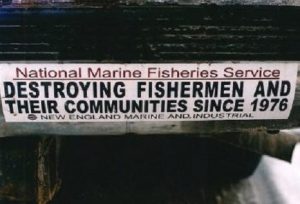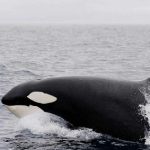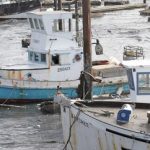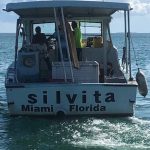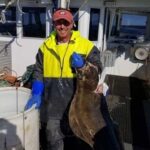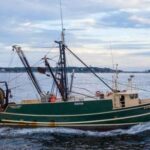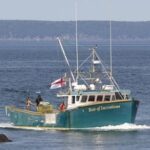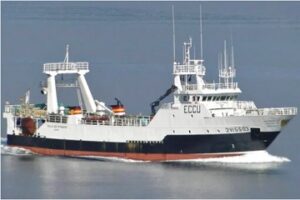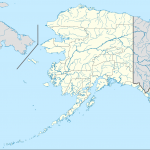Category Archives: International
As Alaska’s crab industry struggles, herring fishermen are losing their market
 Captain Dan Veerhusen and Jan, his wife, run the F/V Taurus, one of the few remaining boats that still fish herring in the Bering Sea. Last summer, in Sand Point, the couple were preparing the 58-foot seiner for what would be Veerhusen’s 30th-or-so season. He’s been fishing herring since 1988, when Unalaska’s Port of Dutch Harbor was at the center of a multimillion-dollar crab boom. “I love herring fishing. It’s real fishing.” he said. “It was a regular, competitive fishery back then. But these days, there’s ourselves, another boat, maybe three boats out there.” The herring fishery in the Bering Sea boomed in the early 20th century but struggled after World War II as Americans lost their appetite for the fish. Demand increased again in the 1970s when the Bering Sea crab industry took off, creating a demand for herring as baitfish. links, more, >>CLICK TO READ<< 16:50
Captain Dan Veerhusen and Jan, his wife, run the F/V Taurus, one of the few remaining boats that still fish herring in the Bering Sea. Last summer, in Sand Point, the couple were preparing the 58-foot seiner for what would be Veerhusen’s 30th-or-so season. He’s been fishing herring since 1988, when Unalaska’s Port of Dutch Harbor was at the center of a multimillion-dollar crab boom. “I love herring fishing. It’s real fishing.” he said. “It was a regular, competitive fishery back then. But these days, there’s ourselves, another boat, maybe three boats out there.” The herring fishery in the Bering Sea boomed in the early 20th century but struggled after World War II as Americans lost their appetite for the fish. Demand increased again in the 1970s when the Bering Sea crab industry took off, creating a demand for herring as baitfish. links, more, >>CLICK TO READ<< 16:50

How the Alabama Seafood Labeling Law is affecting Gulf Coast industry
Almost a year after being signed into law, residents should be beginning to see impacts the Alabama Seafood Labeling Law is having on the local industry. The Seafood Labeling Law was signed into law in May 2024, requiring in-state food establishments, such as grocery stores, restaurants, food trucks and in-store delis, to disclose and label whether any seafood being served was imported or domestically produced, as well as whether the seafood was farm-raised or wild-caught. Sellers are encouraged, but not required, to disclose the country of origin of imported foreign fish or shellfish. It also requires seafood suppliers who sell to these establishments within the state to disclose the country of origin so the retailers can accurately inform customers. It does not apply to ingredients in processed food. more, >>CLICK TO READ<< 07:47
Hitting pause: Talks to set price for 2025 snow crab season in NL on hold
 There’s still no deal, but both sides trying to hammer out a new pricing formula for Newfoundland and Labrador’s snow crab fishery have agreed to pause talks until March 19. That will be one day after Seafood Expo North America, the major annual seafood show in Boston, where this year’s provincial delegation will be looking to convince American buyers that tariffs placed on Canadian exports, including seafood, are not a good thing for the sector. The negotiators from both FFAW-Unifor, the union that represents fish harvesters and plant workers, and the Association of Seafood Producers (ASP), which represents fish processing companies, have met several times since the middle of January to try to hammer out a snow crab price for the 2025 season. more, >>CLICK TO READ<< 06:38
There’s still no deal, but both sides trying to hammer out a new pricing formula for Newfoundland and Labrador’s snow crab fishery have agreed to pause talks until March 19. That will be one day after Seafood Expo North America, the major annual seafood show in Boston, where this year’s provincial delegation will be looking to convince American buyers that tariffs placed on Canadian exports, including seafood, are not a good thing for the sector. The negotiators from both FFAW-Unifor, the union that represents fish harvesters and plant workers, and the Association of Seafood Producers (ASP), which represents fish processing companies, have met several times since the middle of January to try to hammer out a snow crab price for the 2025 season. more, >>CLICK TO READ<< 06:38
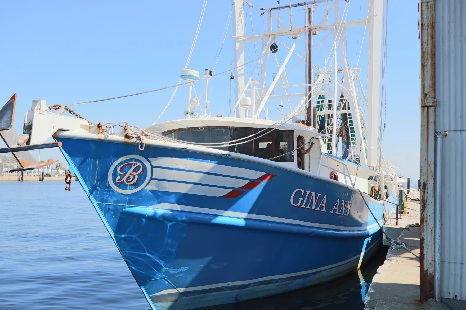
Amid ‘shrimp fraud’ reports, Tampa Bay area shrimpers need support
When restaurants charge a premium for Gulf-caught shrimp and pocket the extra profit by serving farm-raised imported shrimp, they’re denying local shrimpers a fair income. A recent study by SeaD Consulting revealed that 42 out of 44 Tampa Bay area restaurants surveyed were falsely passing off imported shrimp as locally caught. Local shrimpers say the effects of this kind of shrimp fraud go beyond betrayed diners. Shrimper Merritt Joseph Latino has been in the business for over 17 years. On one arm, underneath an anchor tattoo, the words “shrimpin’ ain’t easy” are permanently emblazoned in ink. Photos, more, >>CLICK TO READ<< 07:38
Snow crab now crab as FFAW and ASP show willingness to work together
 A week of long days and almost around the clock negotiations has left the Fish, Food and Allied Workers union and the Association of Seafood Producers optimistic that a snow crab harvest will happen this year. “The FFAW and ASP have done an incredible job together to have constructive conversations at this point,” ASP executive director Jeff Loder said Wednesday. “Of course, until you get a deal, you have no deal. But I am cautiously optimistic that we are close.” The two sides are keen to negotiate a deal as soon as possible. A meeting with a price setting panel is scheduled for March 20 should the two sides not make an agreement by then. Video, more, >>CLICK TO READ<< 06:08
A week of long days and almost around the clock negotiations has left the Fish, Food and Allied Workers union and the Association of Seafood Producers optimistic that a snow crab harvest will happen this year. “The FFAW and ASP have done an incredible job together to have constructive conversations at this point,” ASP executive director Jeff Loder said Wednesday. “Of course, until you get a deal, you have no deal. But I am cautiously optimistic that we are close.” The two sides are keen to negotiate a deal as soon as possible. A meeting with a price setting panel is scheduled for March 20 should the two sides not make an agreement by then. Video, more, >>CLICK TO READ<< 06:08
Humane, sustainable Canadian seal harvests an environmental necessity, says USIANL
 The United Seal Industry Association of Newfoundland & Labrador (USIANL) has created a fact-based campaign explaining the environmental necessity for Canada to carry out sustainable seal harvests. The campaign is being piloted in N.L., Halifax, Toronto, Ottawa, Edmonton, Winnipeg, and Vancouver. USIANL was created to help Canadians understand that humane, sustainable seal harvests are an environmental necessity. The harp seal population off N.L. is the largest in the world – numbering in the millions. Not only are harp seals depleting important fish species and everything those species feed on, but fierce competition for food is putting their own well-being at risk. more, >>CLICK TO READ<< 09:39
The United Seal Industry Association of Newfoundland & Labrador (USIANL) has created a fact-based campaign explaining the environmental necessity for Canada to carry out sustainable seal harvests. The campaign is being piloted in N.L., Halifax, Toronto, Ottawa, Edmonton, Winnipeg, and Vancouver. USIANL was created to help Canadians understand that humane, sustainable seal harvests are an environmental necessity. The harp seal population off N.L. is the largest in the world – numbering in the millions. Not only are harp seals depleting important fish species and everything those species feed on, but fierce competition for food is putting their own well-being at risk. more, >>CLICK TO READ<< 09:39
Fuming fishermen hit out at John Swinney’s ‘disrespect’ as calls grow for urgent Holyrood debate
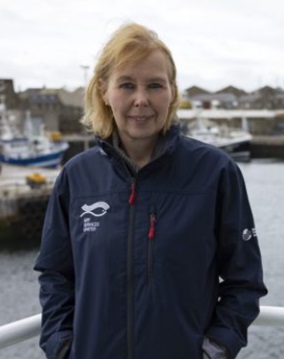 The SNP Government has been urged to hold its first fishing debate in almost three years before Easter amid fears over offshore wind developments. It comes after John Swinney was advised by officials not to use the term ‘spatial squeeze’ during talks with fishing industry leaders in Shetland last year. The term was first put forward by the Scottish Fishermen’s Federation (SFF) to describe the loss of fishing ground to other uses such as offshore wind farms and marine protected areas. Elspeth Macdonald, chief executive of the SFF, said: “It’s disgraceful, when it plans systematically and permanently to exclude fishermen from traditional fishing grounds to build colossal offshore wind farms, that a Scottish Government official briefed the First Minister not to recognise their deeply held concerns for their future livelihoods. more, >>CLICK TO READ<< 08:49
The SNP Government has been urged to hold its first fishing debate in almost three years before Easter amid fears over offshore wind developments. It comes after John Swinney was advised by officials not to use the term ‘spatial squeeze’ during talks with fishing industry leaders in Shetland last year. The term was first put forward by the Scottish Fishermen’s Federation (SFF) to describe the loss of fishing ground to other uses such as offshore wind farms and marine protected areas. Elspeth Macdonald, chief executive of the SFF, said: “It’s disgraceful, when it plans systematically and permanently to exclude fishermen from traditional fishing grounds to build colossal offshore wind farms, that a Scottish Government official briefed the First Minister not to recognise their deeply held concerns for their future livelihoods. more, >>CLICK TO READ<< 08:49
Fishing industry asks Supreme Court to hear case against Vineyard Wind
 A national fishing industry group and conservation think tank have petitioned the U.S. Supreme Court to take up their lawsuits challenging the approval of the Vineyard Wind project, which has been under construction since 2023. The lobbying group, Responsible Offshore Development Alliance (RODA), sued the lead government regulator of offshore wind in early 2022, alleging the agency violated several acts, including those to protect existing ocean users and endangered species. At the crux of RODA’s appeal to the Supreme Court is the language of the Outer Continental Shelf Lands Act, and particularly, how the federal government interpreted it. more, >>CLICK TO READ<< 06:52
A national fishing industry group and conservation think tank have petitioned the U.S. Supreme Court to take up their lawsuits challenging the approval of the Vineyard Wind project, which has been under construction since 2023. The lobbying group, Responsible Offshore Development Alliance (RODA), sued the lead government regulator of offshore wind in early 2022, alleging the agency violated several acts, including those to protect existing ocean users and endangered species. At the crux of RODA’s appeal to the Supreme Court is the language of the Outer Continental Shelf Lands Act, and particularly, how the federal government interpreted it. more, >>CLICK TO READ<< 06:52
N.S. premier promoting seafood, minerals on New York, Boston trade junket
 Nova Scotia’s premier is promoting the province’s seafood and critical mineral deposits on a tour that will take him to Boston and New York this week and next. “Now, more than ever, we have to diversify our economy,” Houston said in a government release. “We have to go where the buyers are. Nova Scotia has a lot to offer, from high-quality products like seafood and resources like critical minerals.” The province exported more than a billion dollars’ worth of lobster in 2024, making lobster its second largest export. The two countries that collectively import about 80 per cent of live Nova Scotia lobsters are China and the United States, both of which have said lobster will face tariffs in the coming weeks. more, >>CLICK TO READ<< 15:28
Nova Scotia’s premier is promoting the province’s seafood and critical mineral deposits on a tour that will take him to Boston and New York this week and next. “Now, more than ever, we have to diversify our economy,” Houston said in a government release. “We have to go where the buyers are. Nova Scotia has a lot to offer, from high-quality products like seafood and resources like critical minerals.” The province exported more than a billion dollars’ worth of lobster in 2024, making lobster its second largest export. The two countries that collectively import about 80 per cent of live Nova Scotia lobsters are China and the United States, both of which have said lobster will face tariffs in the coming weeks. more, >>CLICK TO READ<< 15:28
Mass Layoffs at Companies Working on Humboldt Offshore Wind Projects; At Least Some Local People Laid Off
 The future of Humboldt County’s offshore wind industry appears increasingly uncertain following mass layoffs at RWE and Vineyard Offshore, the multinational energy companies leading efforts to develop commercial-scale floating wind farms on the North Coast. The job cuts come in response to widespread market uncertainty following President Donald Trump’s efforts to ban offshore wind development in the United States. In a regulatory filing submitted last week, RWE Offshore Wind Services, LLC confirmed its plans to cut dozens of jobs in its U.S. offshore wind division. Lots of links. more, >>CLICK TO READ<< 11:38
The future of Humboldt County’s offshore wind industry appears increasingly uncertain following mass layoffs at RWE and Vineyard Offshore, the multinational energy companies leading efforts to develop commercial-scale floating wind farms on the North Coast. The job cuts come in response to widespread market uncertainty following President Donald Trump’s efforts to ban offshore wind development in the United States. In a regulatory filing submitted last week, RWE Offshore Wind Services, LLC confirmed its plans to cut dozens of jobs in its U.S. offshore wind division. Lots of links. more, >>CLICK TO READ<< 11:38
Chinese tariffs on Canadian seafood would serve ‘devastating’ double whammy, fisheries council says
 The Fisheries Council of Canada says tariffs on Canadian seafood entering China spells disaster for the industry — including in Newfoundland and Labrador — and serves as a double whammy with U.S. tariffs already in play. China announced it would impose a 25 per cent tariff on Canadian seafood effective March 20 as a retaliatory measure to Canadian tariffs on steel, aluminum and electric vehicles in the fall. The list of over 40 products facing the tariff includes lobster, crab, shrimp, halibut and more. “Some of the fisheries, some of the species that go to China, are almost exclusively going to China,” council chair Alberto Wareham told CBC News from Arnold’s Cove, N.L. on Tuesday. more, >>CLICK TO READ<< 09:56
The Fisheries Council of Canada says tariffs on Canadian seafood entering China spells disaster for the industry — including in Newfoundland and Labrador — and serves as a double whammy with U.S. tariffs already in play. China announced it would impose a 25 per cent tariff on Canadian seafood effective March 20 as a retaliatory measure to Canadian tariffs on steel, aluminum and electric vehicles in the fall. The list of over 40 products facing the tariff includes lobster, crab, shrimp, halibut and more. “Some of the fisheries, some of the species that go to China, are almost exclusively going to China,” council chair Alberto Wareham told CBC News from Arnold’s Cove, N.L. on Tuesday. more, >>CLICK TO READ<< 09:56
The ‘sustainable’ cod in your shopping basket may be no such thing – new study reveals mislabelling
 Cod sold in some European supermarkets is being mislabeled and is actually fished far from its claimed origin, according to our new study. We sampled cod sold in Germany, Spain, France and the UK and found that about 30% of it originated in a different location. Seafood mislabeling, in which one species is sold as another, is a common problem. It may happen by mistake or by deliberate fraud, in which case, there is at least hope for improvement, as various DNA methods are now available for testing species. But our new research highlights another problem: the mislabeling of geographical origin. As with species mislabeling, this issue can affect the sustainable management of fisheries, the conservation of fish in the wild and consumer trust. more, >>CLICK TO READ<< 14:53
Cod sold in some European supermarkets is being mislabeled and is actually fished far from its claimed origin, according to our new study. We sampled cod sold in Germany, Spain, France and the UK and found that about 30% of it originated in a different location. Seafood mislabeling, in which one species is sold as another, is a common problem. It may happen by mistake or by deliberate fraud, in which case, there is at least hope for improvement, as various DNA methods are now available for testing species. But our new research highlights another problem: the mislabeling of geographical origin. As with species mislabeling, this issue can affect the sustainable management of fisheries, the conservation of fish in the wild and consumer trust. more, >>CLICK TO READ<< 14:53
VESSEL REVIEW | Ecofive – New Norwegian shrimp and whitefish trawler boasts innovative catch handling setup
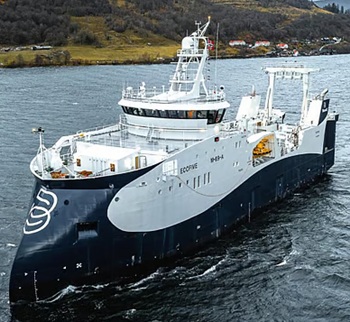 Norway’s Westcon Yards recently delivered a new factory trawler to local seafood company Bluewild. Designed by Norway’s Ulstein Design and Solutions, the DNV-classed Ecofive (an abbreviation of “Eco-Friendly Fishing Vessel”) was developed to ensure 100 per cent catch utilisation, minimised quality losses during handling, and reduced energy consumption. The concept focuses on utilising resources so that the main product, the by-products, and residual raw materials will be of very high quality. The newbuild has a steel hull, a length of 74 metres (240 feet), a beam of 16.8 metres (55.1 feet), a displacement of 2,200 tonnes, a speed of 14.5 knots, and accommodation for 30 personnel. The propulsion delivers bollard pulls of 85 tonnes at 2.5 knots and 75 tonnes at 4.5 knots. Photos, specifications. more, >>CLICK TO READ<< 12:15
Norway’s Westcon Yards recently delivered a new factory trawler to local seafood company Bluewild. Designed by Norway’s Ulstein Design and Solutions, the DNV-classed Ecofive (an abbreviation of “Eco-Friendly Fishing Vessel”) was developed to ensure 100 per cent catch utilisation, minimised quality losses during handling, and reduced energy consumption. The concept focuses on utilising resources so that the main product, the by-products, and residual raw materials will be of very high quality. The newbuild has a steel hull, a length of 74 metres (240 feet), a beam of 16.8 metres (55.1 feet), a displacement of 2,200 tonnes, a speed of 14.5 knots, and accommodation for 30 personnel. The propulsion delivers bollard pulls of 85 tonnes at 2.5 knots and 75 tonnes at 4.5 knots. Photos, specifications. more, >>CLICK TO READ<< 12:15
New Laws, Fines, and Genetic Testing in the Battle Over Shrimp Labeling
 When considering things that are distinctly American, several spring to mind. Baseball. Hot dogs. Apple pie. And . . . really good shrimp? While shrimp aren’t unique to the United States, few varieties are as lauded as those caught in the Gulf of Mexico and the Atlantic Ocean by southeastern states such as the Carolinas, Georgia, and Florida. Recent testing has shown that as much as 80% of the shrimp being touted as Gulf- or Atlantic-caught are instead coming from farms in foreign countries. Many diners are getting shellfish considered inferior to what they ordered. And that’s a problem. Efforts are being made on federal and state levels to ensure truth-in-labeling becomes the norm. more, >>CLICK TO READ<< 10:30
When considering things that are distinctly American, several spring to mind. Baseball. Hot dogs. Apple pie. And . . . really good shrimp? While shrimp aren’t unique to the United States, few varieties are as lauded as those caught in the Gulf of Mexico and the Atlantic Ocean by southeastern states such as the Carolinas, Georgia, and Florida. Recent testing has shown that as much as 80% of the shrimp being touted as Gulf- or Atlantic-caught are instead coming from farms in foreign countries. Many diners are getting shellfish considered inferior to what they ordered. And that’s a problem. Efforts are being made on federal and state levels to ensure truth-in-labeling becomes the norm. more, >>CLICK TO READ<< 10:30
PML Study Examines UK Wind Farm, Fishermen Conflicts
 Researchers at Plymouth Marine Laboratory (PML), alongside colleagues at the University of Aberdeen, found that the majority of UK fishermen feel their livelihoods are being threatened by the rapid expansion of offshore wind farms (OWFs), with impacts felt across all vessel sizes and fleet sectors. “Our survey revealed that fishermen across all fleet sectors are experiencing social, wellbeing, and economic impacts from offshore wind developments,” said Claire Szostek, lead author on the paper. “While a small minority identified potential benefits, most fishermen feel their fishing grounds and livelihoods are under threat. What’s particularly concerning is the lack of standardization in compensation payments made to those affected.” more, >>CLICK TO READ<< 08:20
Researchers at Plymouth Marine Laboratory (PML), alongside colleagues at the University of Aberdeen, found that the majority of UK fishermen feel their livelihoods are being threatened by the rapid expansion of offshore wind farms (OWFs), with impacts felt across all vessel sizes and fleet sectors. “Our survey revealed that fishermen across all fleet sectors are experiencing social, wellbeing, and economic impacts from offshore wind developments,” said Claire Szostek, lead author on the paper. “While a small minority identified potential benefits, most fishermen feel their fishing grounds and livelihoods are under threat. What’s particularly concerning is the lack of standardization in compensation payments made to those affected.” more, >>CLICK TO READ<< 08:20
Near and Far: Changes needed as NL seafood sector navigates new economic realities
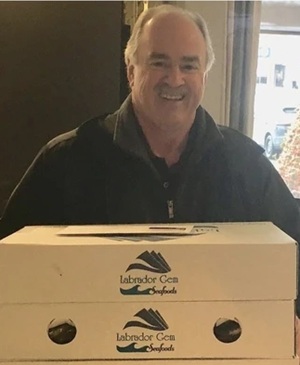 There is no question for Danny Dumaresque that the fishery in Newfoundland and Labrador needs to expand into the European marketplace, but diversifying means some changes on the home front, too. Dumaresque owns Labrador Gem Seafoods and, while others involved in the fishery were participating in a roundtable discussion about the potential impact of American tariffs on Canadian exports, he was overseas searching for new buyers for his company’s products. Dumaresque is still planning to head to the annual Seafood Expo North America in Boston as part of the Newfoundland and Labrador delegation from March 16 to 18. There, he and others involved in the province’s seafood industry will try to further drive home the fact that tariffs imposed by their government will drive up the price American customers will have to pay for Canadian fish. more, >>CLICK TO READ<< 06:55
There is no question for Danny Dumaresque that the fishery in Newfoundland and Labrador needs to expand into the European marketplace, but diversifying means some changes on the home front, too. Dumaresque owns Labrador Gem Seafoods and, while others involved in the fishery were participating in a roundtable discussion about the potential impact of American tariffs on Canadian exports, he was overseas searching for new buyers for his company’s products. Dumaresque is still planning to head to the annual Seafood Expo North America in Boston as part of the Newfoundland and Labrador delegation from March 16 to 18. There, he and others involved in the province’s seafood industry will try to further drive home the fact that tariffs imposed by their government will drive up the price American customers will have to pay for Canadian fish. more, >>CLICK TO READ<< 06:55
China slaps 25 per cent tariff on N.S. lobster, throwing seafood industry into turmoil
 Chinese counter tariffs on Canadian seafood will include east coast lobster. Nova Scotian exporters have heard directly from buyers in China that the 25 per cent tariff goes into effect March 20. “For America and China to simultaneously, and for entirely different reasons, target Canadian seafood is incredibly poor luck, and beyond that it is incredibly hard to comprehend,” Stewart Lamont, owner of Tangier Lobster, said on Sunday. Just over 40 per cent of Nova Scotia’s live lobster exports go to China. About 40 per cent of live lobster exports, along with 70 per cent of frozen processed lobster, go to the United States. more, >>CLICK TO READ<< 12:10
Chinese counter tariffs on Canadian seafood will include east coast lobster. Nova Scotian exporters have heard directly from buyers in China that the 25 per cent tariff goes into effect March 20. “For America and China to simultaneously, and for entirely different reasons, target Canadian seafood is incredibly poor luck, and beyond that it is incredibly hard to comprehend,” Stewart Lamont, owner of Tangier Lobster, said on Sunday. Just over 40 per cent of Nova Scotia’s live lobster exports go to China. About 40 per cent of live lobster exports, along with 70 per cent of frozen processed lobster, go to the United States. more, >>CLICK TO READ<< 12:10
Scottish fishing industry backing by PM welcomed by north-east MP Seamus Logan

Aberdeenshire North and Moray East MP Seamus Logan
A north-east MP has secured a firm commitment from the Prime Minister to support the Scottish fisheries sector. In a question to Keir Starmer MP at Prime Minister’s Questions, Aberdeenshire North and Moray East MP Seamus Logan raised the vital contribution of the Scottish fishing industry in terms of volume and value to the UK. Mr. Logan highlighted the importance of protecting its interests and future as the UK government pursue economic growth and a reset in relations with the European Union to which the Prime Minister responded positively in agreement. more, >>CLICK TO READ<< 13:53
Canada commits over C$6 billion to fight impact of US tariffs, find new markets
 Canada on Friday unveiled billions of dollars in aid and other forms of support to businesses and people expected to be directly affected by U.S. tariffs. These relief measures involve over C$6.5 billion ($4.52 billion) of financial aid to help companies tap new international markets, absorb the impact of losses, access easy loans and prevent layoffs, a team of ministers said. U.S. President Donald Trump’s administration imposed 25% tariffs on most imports from Canada and Mexico earlier this week, before announcing a suspension of the charges until April 2 on goods covered by the U.S.-Mexico-Canada Agreement on trade. “We are moving ahead with these changes despite yesterday’s pause because businesses and workers need assurances right now,” Labour Minister Steven MacKinnon said at a news conference on Friday. more, >>CLICK TO READ<< 09:35
Canada on Friday unveiled billions of dollars in aid and other forms of support to businesses and people expected to be directly affected by U.S. tariffs. These relief measures involve over C$6.5 billion ($4.52 billion) of financial aid to help companies tap new international markets, absorb the impact of losses, access easy loans and prevent layoffs, a team of ministers said. U.S. President Donald Trump’s administration imposed 25% tariffs on most imports from Canada and Mexico earlier this week, before announcing a suspension of the charges until April 2 on goods covered by the U.S.-Mexico-Canada Agreement on trade. “We are moving ahead with these changes despite yesterday’s pause because businesses and workers need assurances right now,” Labour Minister Steven MacKinnon said at a news conference on Friday. more, >>CLICK TO READ<< 09:35
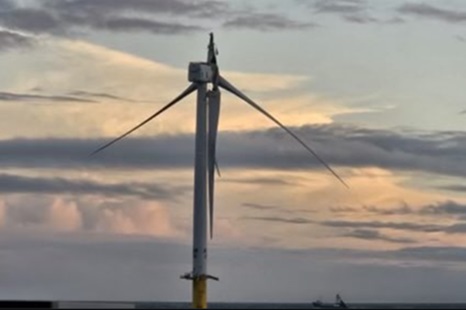
Damaged Wind Turbine that Polluted Nantucket Beaches Last Year Further Damaged in Lightning Strike
Lightning struck a wind turbine off the coast of Nantucket, Massachusetts, last week, further damaging a turbine operated by Vineyard Wind that made headlines last year when its blade fell off, polluting the ocean and nearby beaches. “The coverup blows on. Vineyard Wind’s lack of transparency around the structural integrity of its mammoth wind turbines is deeply frustrating to fishermen,” said Jerry Leeman, CEO of the New England Fishermen’s Stewardship Association. “In fact, Vineyard Wind officials met in February with officials from the Bureau of Safety and Environment Enforcement to discuss improving communications over safety issues. Foreign offshore wind developers seem breezily dismissive of commercial fishermen,” he added. Photos, more, >>CLICK TO READ<< 07:15
Trump’s Offshore Wind Review to Consider Status of Projects
 The Trump administration’s ongoing review of offshore wind projects will feature different treatment for projects actively under development versus those that have merely been proposed, Interior Secretary Doug Burgum said Thursday. Burgum’s comments during a visit to a natural gas export terminal in Louisiana suggest the administration may apply less scrutiny to wind farms that have already secured federal permits and are under construction. President Donald Trump indefinitely halted the sale of new offshore wind leases on his first day in office and pausing permitting of all wind projects on federal lands and waters. He also raised the specter of outright cancellations for existing leases. The president directed the Interior Department to review the “necessity of terminating or amending any existing wind energy leases” and “identifying any legal bases for such removal.” more, >>CLICK TO READ<< 12:26
The Trump administration’s ongoing review of offshore wind projects will feature different treatment for projects actively under development versus those that have merely been proposed, Interior Secretary Doug Burgum said Thursday. Burgum’s comments during a visit to a natural gas export terminal in Louisiana suggest the administration may apply less scrutiny to wind farms that have already secured federal permits and are under construction. President Donald Trump indefinitely halted the sale of new offshore wind leases on his first day in office and pausing permitting of all wind projects on federal lands and waters. He also raised the specter of outright cancellations for existing leases. The president directed the Interior Department to review the “necessity of terminating or amending any existing wind energy leases” and “identifying any legal bases for such removal.” more, >>CLICK TO READ<< 12:26
‘Cruel’ tariff threats bring endless uncertainty to N.B. fisheries
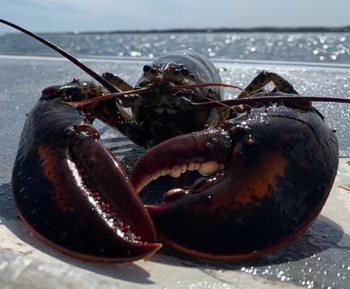 Leaders in New Brunswick’s fishing industry are not mincing words when it comes to the cloud of uncertainty hanging over the constant back and forth of tariff threats from U.S. President Donald Trump. “Oh, it’s painful. It’s painful,” said Geoff Irvine, executive director of the Lobster Council of Canada, in an interview. The latest date for tariffs to take effect, now set for April 2, coincides with the opening of lobster season in some sectors of the Atlantic region, but that’s about all Irvine could say for certain about the potential impact. “Honestly, I don’t have a clue. Every single processor, shipper and exporter will have to talk to their customers.” He said the constantly changing news is destabilizing. more, >>CLICK TO READ<< 11:31
Leaders in New Brunswick’s fishing industry are not mincing words when it comes to the cloud of uncertainty hanging over the constant back and forth of tariff threats from U.S. President Donald Trump. “Oh, it’s painful. It’s painful,” said Geoff Irvine, executive director of the Lobster Council of Canada, in an interview. The latest date for tariffs to take effect, now set for April 2, coincides with the opening of lobster season in some sectors of the Atlantic region, but that’s about all Irvine could say for certain about the potential impact. “Honestly, I don’t have a clue. Every single processor, shipper and exporter will have to talk to their customers.” He said the constantly changing news is destabilizing. more, >>CLICK TO READ<< 11:31
Savannah shrimp scandal: New study reveals majority of local restaurants serve imported shrimp
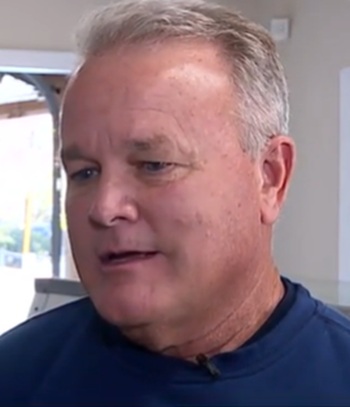
Tybee Seafood Market owner Brian Anderson, “Pond-raised products are not coming into this store. It’s not going to happen,” Anderson said firmly.
A new study has uncovered that more than 70% of shrimp served in Savannah’s seafood restaurants is imported, raising concerns about transparency and food safety. The findings come amid growing support for a Georgia seafood bill that would require restaurants to disclose where their seafood, especially shrimp, comes from. SEAD Consulting, a research firm specializing in food sourcing, tested shrimp at 44 seafood restaurants in the Savannah area. The company used the Rapid ID Genetic High-Accuracy Test (RIGHTTest) to perform the testing. Seventy-seven percent of those establishments were found to be serving imported shrimp rather than locally sourced seafood. Only 10 restaurants in the study could confirm their shrimp came from Georgia waters. Video, more, >>CLICK TO READ<< 08:25
Postponement of West OC harbor zoning change continues
 Worcester County officials this week continued to postpone a proposed zoning amendment that would stymie offshore wind developers from operating as a utility in the West Ocean City commercial fishing harbor. “With any big change like this, you know, we want to deliberate. At the end of the day, that’s what we’re doing. We’re taking all information in and we’re deliberating,” said County Administrator Weston Young following Tuesday’s meeting of the Worcester County Board of Commissioners. One section of the bill would prohibit “facilities that are intended to support offshore energy production” while another would ban “public utility structure” as a permitted use. It’s part of the county’s efforts to stop or slow developer US Wind from moving forward on a planned 114-turbine wind farm located about 11 miles offshore. more, >>CLICK TO READ<< 06:49
Worcester County officials this week continued to postpone a proposed zoning amendment that would stymie offshore wind developers from operating as a utility in the West Ocean City commercial fishing harbor. “With any big change like this, you know, we want to deliberate. At the end of the day, that’s what we’re doing. We’re taking all information in and we’re deliberating,” said County Administrator Weston Young following Tuesday’s meeting of the Worcester County Board of Commissioners. One section of the bill would prohibit “facilities that are intended to support offshore energy production” while another would ban “public utility structure” as a permitted use. It’s part of the county’s efforts to stop or slow developer US Wind from moving forward on a planned 114-turbine wind farm located about 11 miles offshore. more, >>CLICK TO READ<< 06:49

Offshore wind will not be allowed on Georges Bank – New moratorium is a response to calls from the fishing industry
Ottawa and Nova Scotia say they will not allow offshore wind developers to place turbines on Georges Bank, a lucrative fishing ground that is already protected from offshore petroleum development. Nova Scotia Energy Minister Trevor Boudreau says Georges Bank will be protected with a 10-year moratorium that can be renewed at the end of the term if supported by both governments. “It’s a very lucrative fishing bank, has an incredible resource there that we’re utilizing to its full potential, and this is about saying: that’s where we’re focused on, is that sector in that area,” Boudreau told reporters at Province House. Boudreau and Jonathan Wilkinson, the federal minister of energy and natural resources, announced Thursday that they have directed their joint offshore energy regulator to apply the moratorium. more, >>CLICK TO READ<< 18:29
Penzance fishing company fined for illegal crab and lobster fishing
 A fishing company has been fined for illegal crab and lobster fishing offences. Rowse Fishing Limited, represented by owner and director Mark Rowse, appeared before Truro Magistrates’ Court in connection with a series of offences relating to undersize fishing and logbook offences. His son Benjamin Rowse was also in the dock for fishing and landing ‘berried’ lobsters and scrubbing off their eggs, which is illegal to do as it damages future stocks by wiping out thousands of unborn shellfish. In court the company blamed its crews. The court was told that in April last year, the Emma Louise TO60 vivier potting vessel owned by Rowse Fishing Ltd, based at the Varfell Park industrial estate in Long Rock, Penzance, landed 750kg of edible crab, 100kg of spider crab and 20kg of lobster. Photos, more, >>CLICK TO READ<< 14:15
A fishing company has been fined for illegal crab and lobster fishing offences. Rowse Fishing Limited, represented by owner and director Mark Rowse, appeared before Truro Magistrates’ Court in connection with a series of offences relating to undersize fishing and logbook offences. His son Benjamin Rowse was also in the dock for fishing and landing ‘berried’ lobsters and scrubbing off their eggs, which is illegal to do as it damages future stocks by wiping out thousands of unborn shellfish. In court the company blamed its crews. The court was told that in April last year, the Emma Louise TO60 vivier potting vessel owned by Rowse Fishing Ltd, based at the Varfell Park industrial estate in Long Rock, Penzance, landed 750kg of edible crab, 100kg of spider crab and 20kg of lobster. Photos, more, >>CLICK TO READ<< 14:15
Government went against scientific advice in setting fishing quotas, court told
 The Government went against scientific advice when it set maximum fishing quotas for 2024, risking the sustainability of stocks and the livelihoods of fishers, the High Court has heard. Blue Marine Foundation is bringing legal action against the Department for Environment, Food and Rural Affairs (Defra), saying it acted contrary to its commitments to protect the UK’s marine environment and fishing industry. Known as the Joint Fisheries Statement (JFS), the Government set eight objectives for managing the UK’s fish stocks, which include sustainability, reducing bycatch, protecting ecosystems and following scientific advice. more, >>CLICK TO READ<< 08:03
The Government went against scientific advice when it set maximum fishing quotas for 2024, risking the sustainability of stocks and the livelihoods of fishers, the High Court has heard. Blue Marine Foundation is bringing legal action against the Department for Environment, Food and Rural Affairs (Defra), saying it acted contrary to its commitments to protect the UK’s marine environment and fishing industry. Known as the Joint Fisheries Statement (JFS), the Government set eight objectives for managing the UK’s fish stocks, which include sustainability, reducing bycatch, protecting ecosystems and following scientific advice. more, >>CLICK TO READ<< 08:03
Fishing industry watches tariff battle, counting the days till spring seasons
 Like everyone, Nova Scotia’s fishing industry has been trying to parse what U.S. President Donald Trump’s tariffs will mean for them. “It’s too early to know yet,” said Geoff Irvine, executive director of the Lobster Council of Canada. There is little lobster coming ashore right now, which buys the industry time to hope for a resolution that sees the 25 per cent tariff on all Canadian products heading south dropped. Fishing will pick up later this month off southwest Nova Scotia as waters warm, and then in April seasons will start opening from Newfoundland and Prince Edward Island to Nova Scotia, with massive quantities of crustaceans coming over wharves throughout the region by May 1. more, >>CLICK TO READ<< 06:29
Like everyone, Nova Scotia’s fishing industry has been trying to parse what U.S. President Donald Trump’s tariffs will mean for them. “It’s too early to know yet,” said Geoff Irvine, executive director of the Lobster Council of Canada. There is little lobster coming ashore right now, which buys the industry time to hope for a resolution that sees the 25 per cent tariff on all Canadian products heading south dropped. Fishing will pick up later this month off southwest Nova Scotia as waters warm, and then in April seasons will start opening from Newfoundland and Prince Edward Island to Nova Scotia, with massive quantities of crustaceans coming over wharves throughout the region by May 1. more, >>CLICK TO READ<< 06:29
Classic boat review: Atlas CN 258
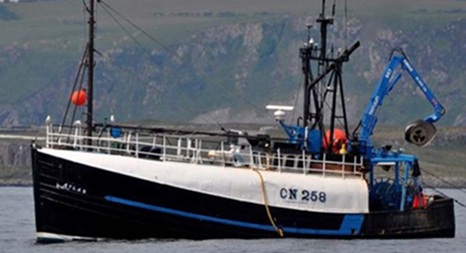 When John Watt took over premises in Macduff and changed the firm’s name to Macduff Boatbuilding and Engineering Company in 1966 to enable 80ft vessels to be built, he probably didn’t realise that smaller boats were, for some years, going to be his bread and butter. One of these was the Atlas, built for William (Billy) West and partners of Macduff in 1973. This was to be a replacement for Ocean Crest BF 116, which they then sold after the new boat was launched. First registered as BF 182, her original engine was a Caterpillar 240hp. At just under 50ft registered length, she stayed within the 25GRT regulations. She paired-trawled with the red- painted Helenus UL 33 for many years. Sometime in the 1980s they replaced the whaleback with a full shelterdeck, covering her in entirely. Excellent photos, more, >>CLICK TO READ<< 15:41
When John Watt took over premises in Macduff and changed the firm’s name to Macduff Boatbuilding and Engineering Company in 1966 to enable 80ft vessels to be built, he probably didn’t realise that smaller boats were, for some years, going to be his bread and butter. One of these was the Atlas, built for William (Billy) West and partners of Macduff in 1973. This was to be a replacement for Ocean Crest BF 116, which they then sold after the new boat was launched. First registered as BF 182, her original engine was a Caterpillar 240hp. At just under 50ft registered length, she stayed within the 25GRT regulations. She paired-trawled with the red- painted Helenus UL 33 for many years. Sometime in the 1980s they replaced the whaleback with a full shelterdeck, covering her in entirely. Excellent photos, more, >>CLICK TO READ<< 15:41


































